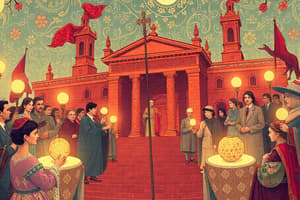Podcast
Questions and Answers
Non-Governmental Aid Organizations (NGO's) provide assistance to people for a large fee.
Non-Governmental Aid Organizations (NGO's) provide assistance to people for a large fee.
False (B)
Civil Society is an instrument for securing rights and interests of the government.
Civil Society is an instrument for securing rights and interests of the government.
False (B)
Civil Society is opposed to both the State and Society.
Civil Society is opposed to both the State and Society.
False (B)
A healthy and efficient democratic system does not need civil society.
A healthy and efficient democratic system does not need civil society.
Civil Society is constituted by the unorganized and inactive presence of social, economic and cultural associations and groups of the people.
Civil Society is constituted by the unorganized and inactive presence of social, economic and cultural associations and groups of the people.
Both Liberalism and Marxism reject the role of Civil Society.
Both Liberalism and Marxism reject the role of Civil Society.
Social movements are always organized and peaceful.
Social movements are always organized and peaceful.
People who are fully accepted and integrated into a group are more susceptible to social movements.
People who are fully accepted and integrated into a group are more susceptible to social movements.
Social unrest is a cause of social movements.
Social unrest is a cause of social movements.
Reform movements aim to bring about revolutionary changes in society.
Reform movements aim to bring about revolutionary changes in society.
Strong leadership is essential for the success of a social movement.
Strong leadership is essential for the success of a social movement.
One of the functions of leadership in achieving goals is to offer ineffective solutions for goal achievement.
One of the functions of leadership in achieving goals is to offer ineffective solutions for goal achievement.
A utopian movement aims to reform existing institutions.
A utopian movement aims to reform existing institutions.
One of the functions of leadership in maintaining and strengthening the movement is to evaluate the movement towards the goal.
One of the functions of leadership in maintaining and strengthening the movement is to evaluate the movement towards the goal.
Social movements and civil society have structures like informal leadership and unclear ideology.
Social movements and civil society have structures like informal leadership and unclear ideology.
Social movements look for gradual change within the existing arrangement of society.
Social movements look for gradual change within the existing arrangement of society.
Social movements and civil society are economic processes that undergo several stages of progression.
Social movements and civil society are economic processes that undergo several stages of progression.
Civil society initiatives and social movements pledge for maintaining the established order of society.
Civil society initiatives and social movements pledge for maintaining the established order of society.
Flashcards are hidden until you start studying
Study Notes
What is Civil Society?
- Civil Society is the aggregate of nongovernmental organizations and institutions that manifest the interest and will of citizens.
- Civil Society consists of nongovernmental, voluntarily organized associations, organizations, and institutions of the people.
- Civil Society is different from both the State and Society, and it works as a supplementary to each of the two in an organized and autonomous way.
- A healthy and efficient democratic system needs and integrates civil society, society, and state.
Role of Civil Society
- Civil Society is an instrument for securing rights and interests of the people.
- Civil Society plays a crucial role in democratic states, and its need is more pronounced in undemocratic states.
Features of Civil Society
- Civil Society is constituted by the well-organized and active presence of social, economic, and cultural associations and groups of the people.
- Both Liberalism and Marxism accept and advocate the role of Civil Society, but each conceptualizes it in a different way.
What is Social Movements?
- Social Movements are large informal groupings of individuals or organizations that focus on specific political or social issues.
- Social Movements aim to bring or resist a change in society.
Features of Social Movements
- It is an effort by a group to bring or resist a change in society.
- It may be organized or unorganized, peaceful or violent, and its life is not certain.
Causes of Social Movements
- Social movements arise from social unrest, which is caused by cultural drifts, social disorganization, and social injustice.
- People more susceptible to social movements are those who are mobile, have little chance to become integrated into the life of the community, and are threatened by economic insecurity and loss of social status.
Types of Social Movements
- Migratory movement
- Expressive movement
- Utopian movement
- Reform movement
- Revolutionary movement
- Resistance movements
Role of Leadership
- Social movements require effective organization and strong leadership to succeed.
- The leader is the spokesman of the group and performs functions such as goal achievement, strengthening of the social movement, making suggestions for action, evaluating the movement towards the goal, and offering effective solutions for goal achievement.
Common Features between Civil Society and Social Movements
- Both have structures like organizations, well-identified leadership, and ideology.
- Both are social processes that undergo several stages of progression from mobilization to intensive collective action.
- Both pledge for change in the established order of society, but Civil Society looks for gradual change within the existing arrangement, while Social Movements may look for radical change by attacking the existing structure of society.
Studying That Suits You
Use AI to generate personalized quizzes and flashcards to suit your learning preferences.




